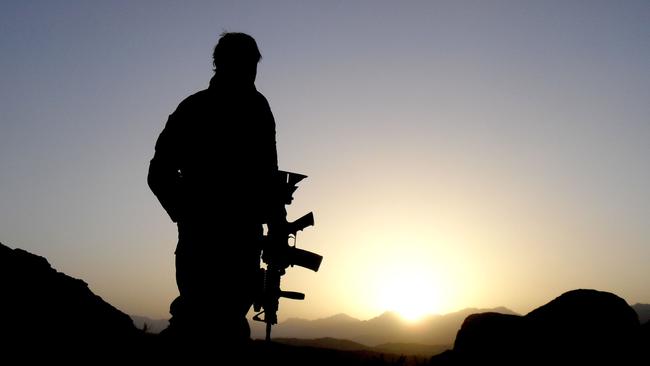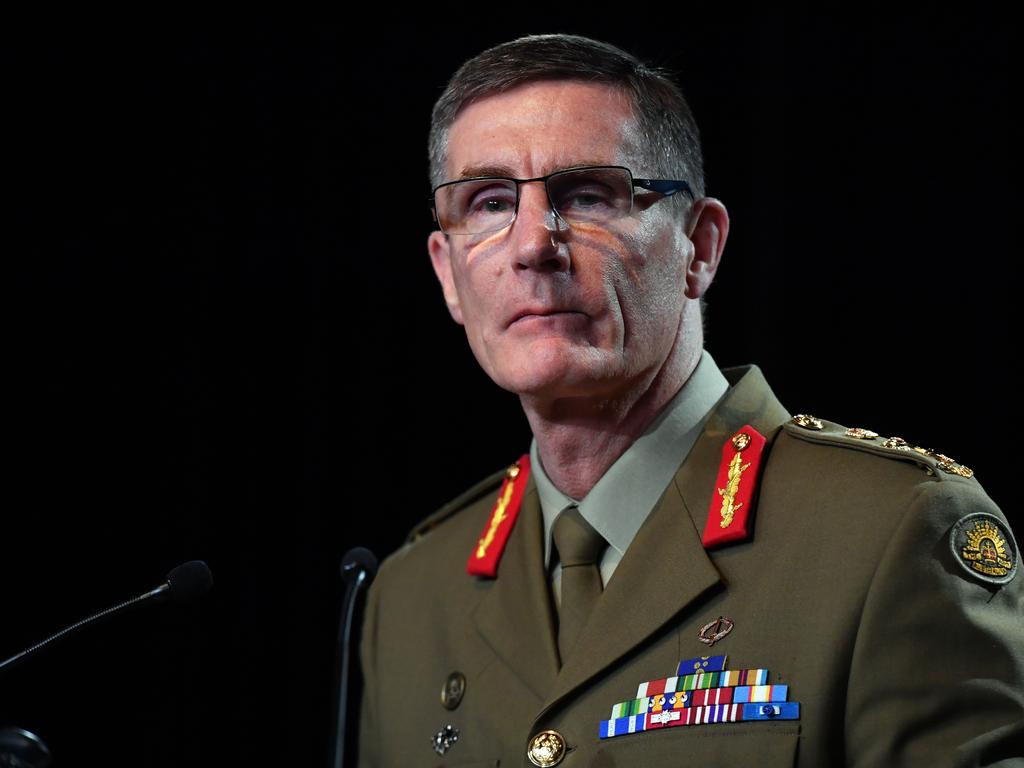
The recommendation by Inspector-General Paul Brereton that the Meritorious Unit Citation be stripped from more than 3000 soldiers who served with the Special Operations Task Force in Afghanistan between 2007 and 2013 has sparked a swift community backlash. And for good reason.
The recommendation, accepted by Chief of Defence General Angus Campbell, is an affront to basic fairness. The notion that thousands of soldiers on different rotations into Afghanistan should bear collective responsibility for the alleged evil actions of 19 soldiers is preposterous. It taints and punishes decent soldiers who were not part of the atrocious findings in the Brereton report.
More than 50,000 Australians who have signed a petition opposing Campbell’s decision may not be well versed in the finer points of the rule of the law. But as citizens they understand that the judge and the general have undermined values that Australian soldiers have fought for: the right to be free from arbitrary and capricious decisions.
This idea was bedded down by the Magna Carta in 1215, described by Lord Denning as “the greatest constitutional document of all times — the foundation of the freedom of the individual against the arbitrary authority of the despot”.
Despots are no longer kings and queens; mercifully, democracies have relegated them to figureheads. But modern despots come in different guises, including leaders who are entrusted to maintain the health of democracies. When they make arbitrary decisions, they undermine the rule of law, a value critical to democracy.
Brereton’s recommendation and Campbell’s acceptance of it show even the most unlikely people can forget, or overlook, or ignore, what the rule of law means. Enlightenment philosopher John Locke explained it in his Second Treatise in Government: it is the natural right of a person that they “should not be subject to the inconstant, uncertain, unknown, arbitrary will of another man”.
Campbell’s announcement last week that he will write to the Governor-General to revoke the Meritorious Unit Citation is tantamount to subjecting innocent Australian soldiers to the “inconstant, uncertain, unknown and arbitrary will” of others. When the innocent are punished capriciously along with the guilty, it removes predictability and proportionality from the governance of a society. The arbitrary rule by people in power is the antithesis of the rule of law.
This is not some fusty old idea for lawyers and philosophers to wrangle with over a whisky. It is part and parcel of a set of fundamental values that we must bequeath to our children. Values survive only when we live them, and pass them on, in sound health, to the next generation, who must do the same for the those who follow them.
It’s easy to forget that democracy is not the natural order for governing a society. This form of government is barely a few hundred years old. Nothing more than a set of ideas advanced by enlightened citizens, it needs both protecting and promoting if it is to survive.
When the Brereton report was handed down, former prime minister John Howard did what every good leader in a democracy should do. Howard expressed his gratitude for soldiers who fought in a long and difficult war. He voiced distress about the findings of credible information about the allegedly unlawful killings of 39 Afghanis, and reminded Australians that these alleged crimes concern a small group of special forces personnel.
Importantly, Howard said: “Due process must be followed. If charges are laid against individuals, they must be handled in accordance with Australia’s criminal justice system. Any personnel charged should enjoy the presumption of innocence.”
Sadly, the highest echelons of the military appear deaf to these pleas. The Chief of Defence’s swift reaction to strip soldiers of the MUC was not just wrong, it jarred with what appears to be a much slower response by the military chief to hold senior commanders accountable for allowing, or turning a blind eye to, the barbarities set out in the report.
Campbell’s decision is a backward step for a democracy. Every time the rule of law is undermined through the arbitrary exercise of power by people in authority, it makes it easier for others, across all walks of life, to do the same. And when the rule of law is eroded more frequently, inevitably, the justification for ignoring basic values will get lamer and lamer.
Witness the obsession of some at the ABC who appear troubled that Seven West Media chairman Kerry Stokes has agreed to fund, through a loan, the legal defence of former SAS soldier Ben Roberts-Smith. The distinguished soldier has launched a defamation case against The Age and The Sydney Morning Herald over a series of articles he says wrongly characterised him as a war criminal. Roberts-Smith has put his service medals up as collateral for the loan. If he can’t repay the loan, he has agreed that Stokes, who is chairman of the Australian War Memorial, can donate the medals to the AWM.
On their programs last week, Fran Kelly and Hamish Macdonald seemed to be disturbed by this arrangement. Their resolve to find wrongdoing by Stokes points to how dangerously complacent even clever people have become to the importance of defending basic values.
Roberts-Smith is entitled to a legal defence. By supporting that right, Stokes, as chairman of the AWM, reinforces that every Australian, including every soldier, is entitled to due process. Instead of asking why Stokes should fund a legal defence for a soldier, we ought to be asking why the heck not? It’s a free country, after all.
When leaders of major institutions erode basic liberties, we should not be surprised when other groups, be they in the media, among #MeToo zealots or corporate leaders wielding capricious codes of conduct, choose arbitrary injustice rather than defending fundamental values.







The rule of law, developed over 800 years by the English common law, is being dismantled in the modern era with alarming alacrity. This fundamental value that protects people from arbitrary injustice isn’t just under attack from a motley crew of misnamed progressives, misguided #MeToo feminists and other discontented souls. It is also coming undone at the hands of distinguished leaders of important institutions who should know better.